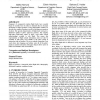Free Online Productivity Tools
i2Speak
i2Symbol
i2OCR
iTex2Img
iWeb2Print
iWeb2Shot
i2Type
iPdf2Split
iPdf2Merge
i2Bopomofo
i2Arabic
i2Style
i2Image
i2PDF
iLatex2Rtf
Sci2ools
CSCW
2006
ACM
2006
ACM
The uses of paper in commercial airline flight operations
Designers of commercial aviation flight decks have recently begun to consider ways to reduce or eliminate the use of paper documents in flight operations. Using ethnographic methods we describe the cognitive functions served by the paper-use practices of pilots. The special characteristics of flight deck work give a distinctive quality to pilots’ paper-use practices. The complex high-stakes high-tempo nature of pilots’ work makes shared understandings essential to safe flight. This means that representation of flight critical information must not only be available to both pilots, but available to the pilots jointly in interaction with one another. The cross-cultural component of our work shows how language and culture color all of the pilots’ practices and how interaction with paper objects allows actors to build social identities and social relations. Categories and Subject Descriptors
| Added | 13 Jun 2010 |
| Updated | 13 Jun 2010 |
| Type | Conference |
| Year | 2006 |
| Where | CSCW |
| Authors | Saeko Nomura, Edwin Hutchins, Barbara E. Holder |
Comments (0)

